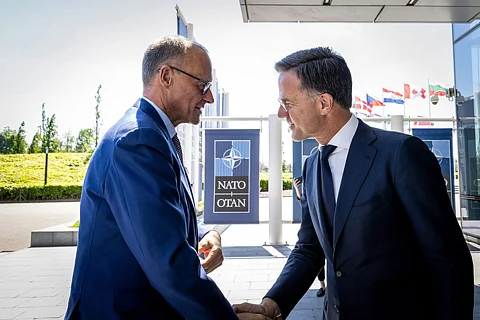

German Chancellor Friedrich Merz met with NATO Secretary General Mark Rutte on Friday at NATO headquarters in Brussels, marking his first official visit to the alliance since taking office earlier this week. The talks focused on preparations for the upcoming NATO Summit in The Hague and Germany's role in strengthening collective defense.
“Germany is a leading power in Europe and plays a crucial role within NATO,” Rutte said at a joint press conference, praising Berlin’s increased defense spending. “Your contributions to our collective security are substantial.”
Rutte emphasized the need to bolster NATO’s capabilities in a rapidly evolving security environment. “We must ensure our militaries have what they need to deter and defend—to keep our one billion citizens safe,” he added.
Merz's visit to NATO follows stops in Paris and Warsaw earlier in the week. During his trip to Brussels, the chancellor is also scheduled to meet with top EU leaders, including European Commission President Ursula von der Leyen, European Council President António Costa, and European Parliament President Roberta Metsola.
Speaking alongside Rutte, Merz struck a more hopeful tone about NATO’s future than in recent months, when he had raised concerns about the alliance’s cohesion under the U.S. administration of President Donald Trump.
“What has changed is the recognition of what we, as European NATO partners, are contributing,” Merz said. “That’s why I approach the upcoming NATO summit in June with more optimism than I did back in February. There is a real chance of forging a unified strategy with the Americans.”
However, Merz tempered expectations regarding Ukraine’s NATO aspirations. While the alliance has agreed in principle to admit Ukraine in the future, no timeline has been set. The Biden administration had supported the move, but the Trump administration has since reversed course.
“Ukraine will not join NATO before joining the European Union,” Merz said, echoing expert assessments that EU membership for Kiev is unlikely before 2030.
Merz has also engaged in Middle East diplomacy during his first days in office. In a phone call with Israeli Prime Minister Benjamin Netanyahu, the chancellor expressed Germany’s “strongest condemnation” of the October 7 Hamas attack and voiced concern for hostages and the humanitarian situation in Gaza, according to government spokesperson Stefan Kornelius.
Merz expressed hope that negotiations toward a ceasefire would begin soon. He also noted upcoming visits to commemorate the 60th anniversary of diplomatic relations between Germany and Israel. Israeli President Isaac Herzog is expected in Berlin on Sunday, with German President Frank-Walter Steinmeier scheduled to accompany him on a return visit to Israel next Tuesday.